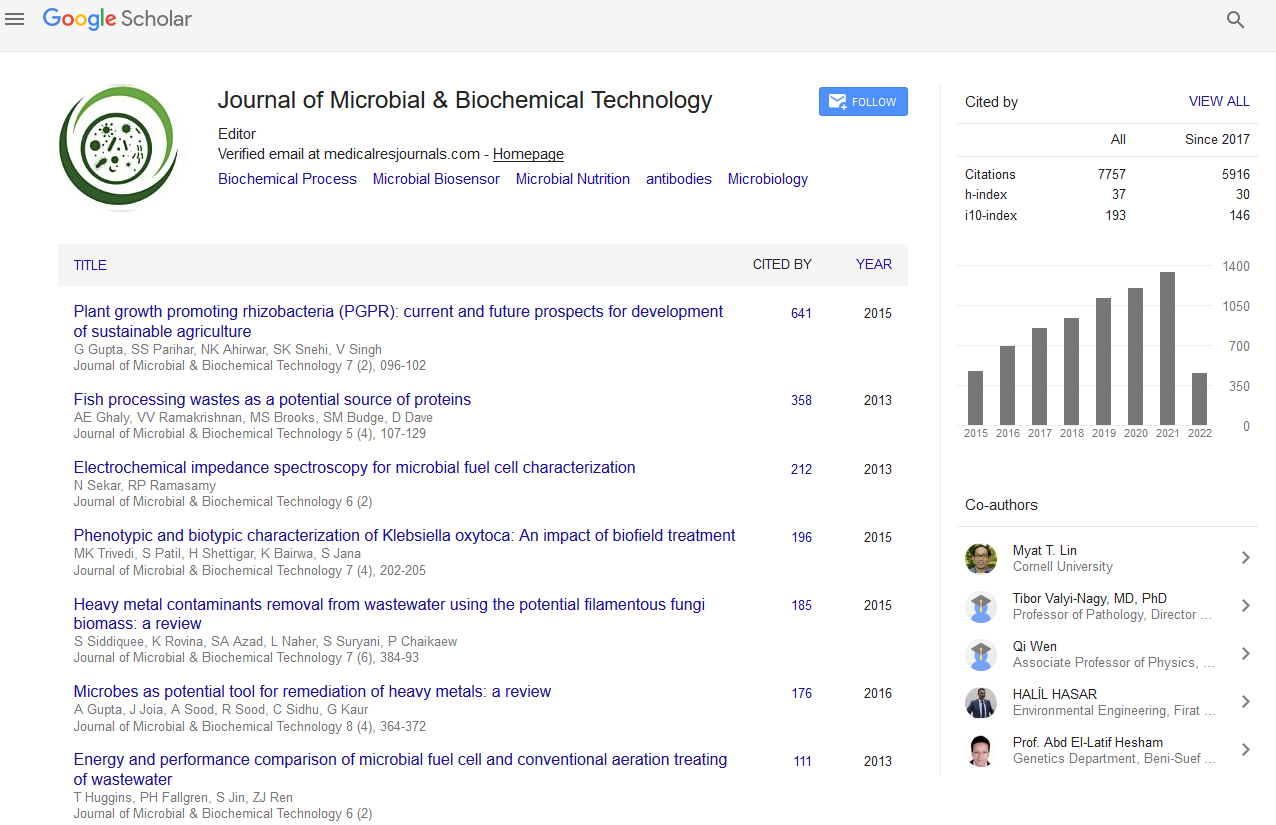PMC/PubMed Indexed Articles
Indexed In
- Academic Journals Database
- Genamics JournalSeek
- Academic Keys
- JournalTOCs
- China National Knowledge Infrastructure (CNKI)
- Scimago
- Access to Global Online Research in Agriculture (AGORA)
- Electronic Journals Library
- RefSeek
- Directory of Research Journal Indexing (DRJI)
- Hamdard University
- EBSCO A-Z
- OCLC- WorldCat
- SWB online catalog
- Virtual Library of Biology (vifabio)
- Publons
- MIAR
- University Grants Commission
- Geneva Foundation for Medical Education and Research
- Euro Pub
- Google Scholar
Useful Links
Share This Page
Journal Flyer

Open Access Journals
- Agri and Aquaculture
- Biochemistry
- Bioinformatics & Systems Biology
- Business & Management
- Chemistry
- Clinical Sciences
- Engineering
- Food & Nutrition
- General Science
- Genetics & Molecular Biology
- Immunology & Microbiology
- Medical Sciences
- Neuroscience & Psychology
- Nursing & Health Care
- Pharmaceutical Sciences
Isolation of four PAH-degrading Burkholderia strains from activated sludge in a petrochemical WWTP
World Congress and Expo on Applied Microbiology
August 18-20, 2015 Frankfurt, Germany
Guilherme Pinto Cauduro1, Ana Lusia Leal1,2, Letícia Gomes de Ávila2, Rosane Conte Fagundes2, Patrícia Dörr Quadros3, Eshwar Mahenthiralingam4 and Victor Hugo Valiati1
1UNISINOS, Brazil 2CORSAN, Brazil 3UFRGS, Brazil 4Cardiff University, UK
Posters-Accepted Abstracts: J Microb Biochem Technol
Abstract:
Polycyclic Aromatic Hydrocarbons (PAH) are among the most persistent pollutants of petroleum by-products. Strategies to study potential biodegradation of these compounds include evaluation of microbial diversity in contaminated areas, the study of gene families involved in aromatic ring-cleavage and isolation of indigenous bacteria. In this work, an enrichment technique with benzo(a)pyrene or naphtalene as sole carbon sources was used to isolate bacteria from activated sludge from a petrochemical Waste Water Treatment Plant (WWTP). Four Burkholderia strains from 3 different species (B. cenocepacia, B. vietnamiensis and B. multivorans) were identified using biochemical and molecular methods. Partial multi-locus sequence typing allowed us to identify two new alleles (genes recA and gyrB) in two of our strains. Another strain had the same alleles as B. vietnamiensis G4, a model strain for hydrocarbon degradation. As further characterization of these strains, we tested their ability to reduce benzo(a)pyrene in vitro. The strains were grown for 7 days, individually and in consortium, in minimal media containing benzo(a)pyrene as sole source of carbon; B. vietnamiensis G4 strain was also tested. While there was no statistical difference among the WWTP isolated strains and the control when they were cultivated individually, the consortium with four strains showed a reduction in 8.6% of benzo(a)pyrene related to the control, similar to G4 strain (9%). Since we found indigenous strains with efficiency comparable to the model G4 strain, these results highlight the potential of the WWTP isolated strains to be used in bioremediation of the contaminated area.
Biography :
Ana Lusia Leal has 16 years of experience in microbiology working in both academic and industrial environments. She is the Head of the Biology Department at the Wastewater Treatment Plant from the Brazilian Third Petrochemical Plant, monitoring the quality of the treatment process and finding solutions to operational and environmental problems.


